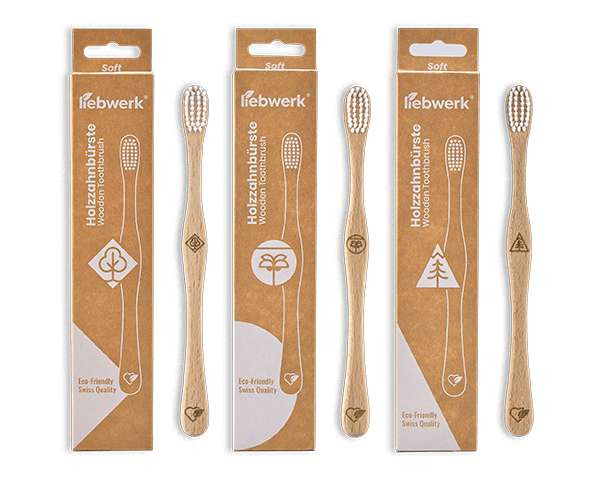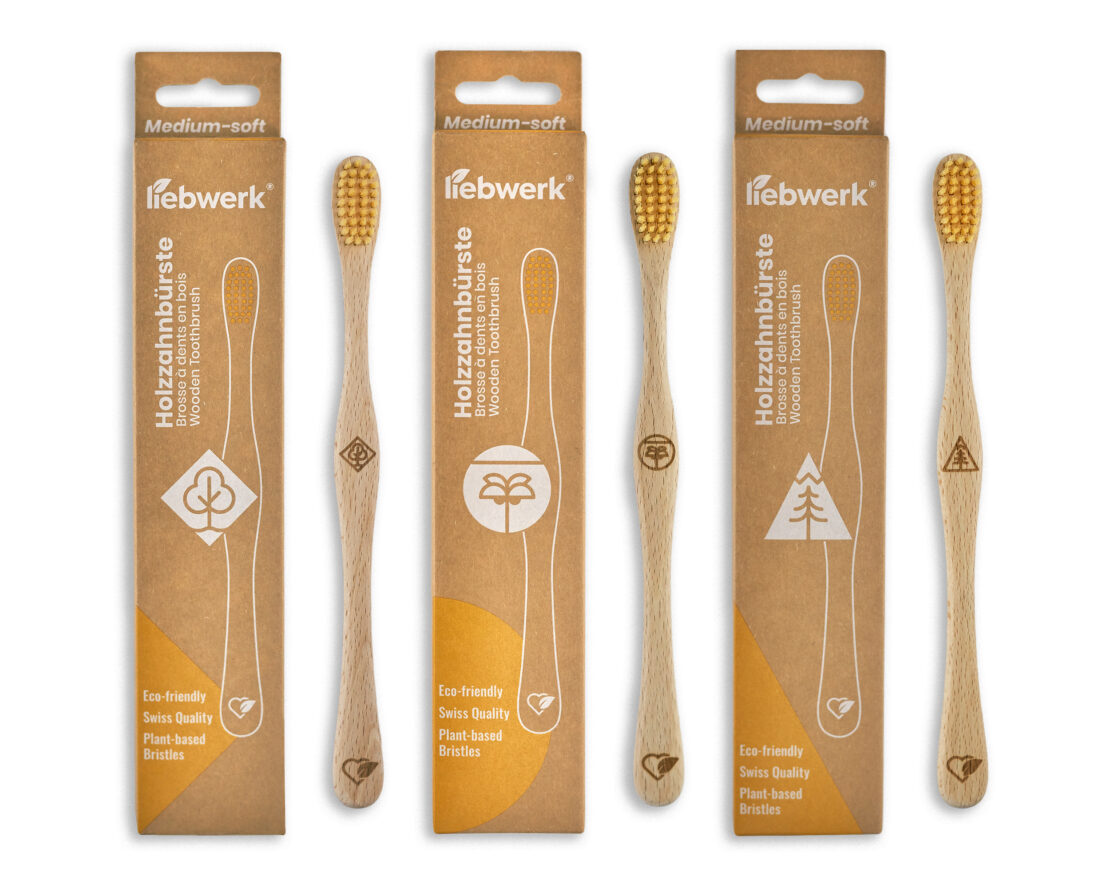Wooden toothbrushes
A choice that matters – Find your perfect toothbrush!!
SOFT Wooden Toothbrush
Do you prefer a gentle brushing experience or have sensitive gums? Try our SOFT toothbrush! Its soft bristles clean effectively while being kind to your teeth and gums. Discover our flagship adult toothbrush today!
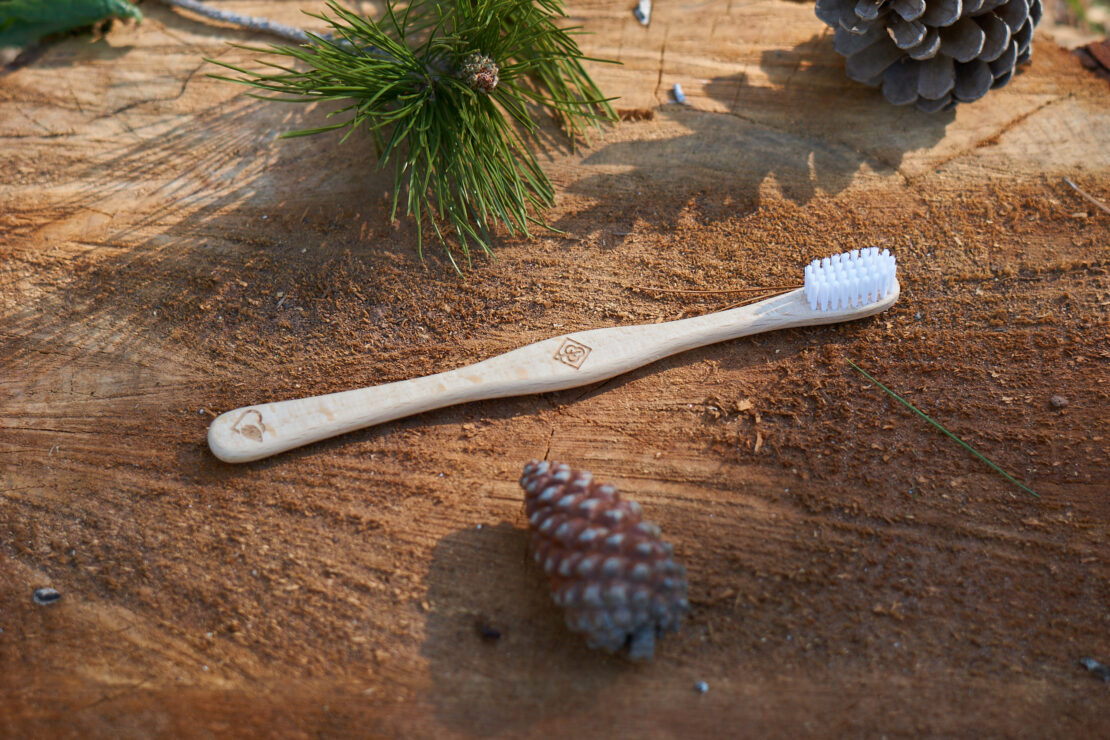
RICINE Wooden Toothbrush
Looking for an even more eco-friendly option? Absolutely! RICINE toothbrush with its medium-soft castor oil bristles is a great, mineral oil-free alternative to conventional nylon bristles. Discover our most sustainable toothbrush here!
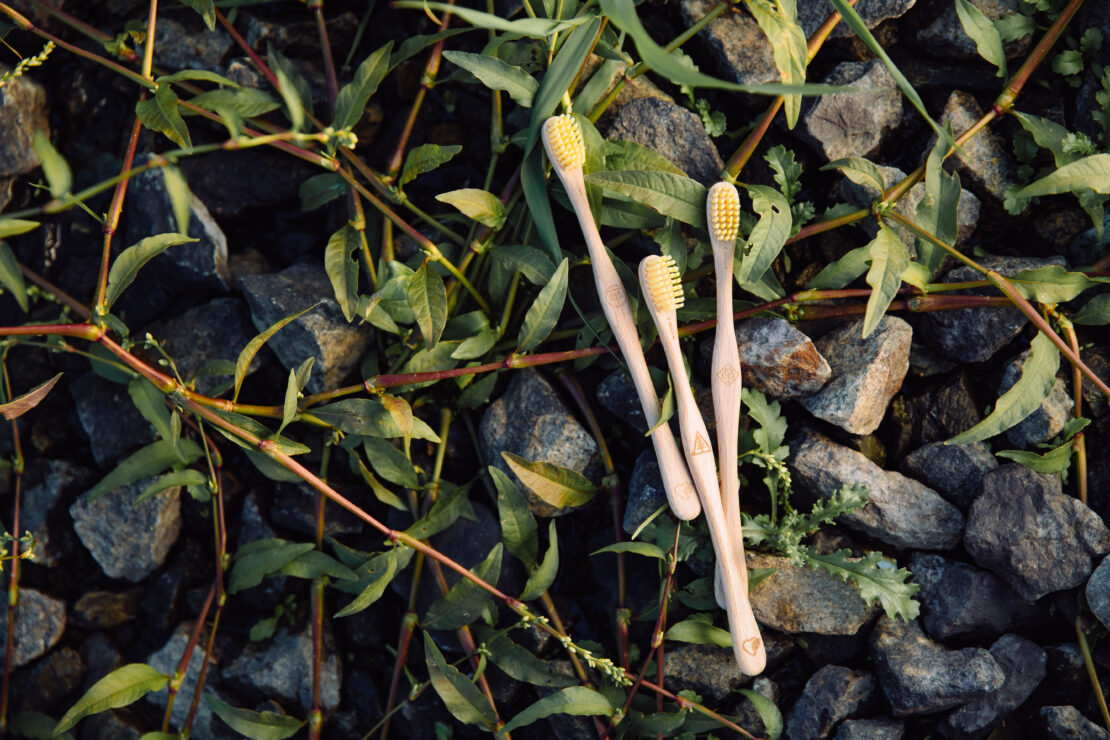
KIDS Wooden Toothbrush
Happy colors, cute animal engravings, and soft bristles: our KIDS toothbrushes are a fun way to get kids excited about daily teeth cleaning! Turn routine into an adventure for your little ones!
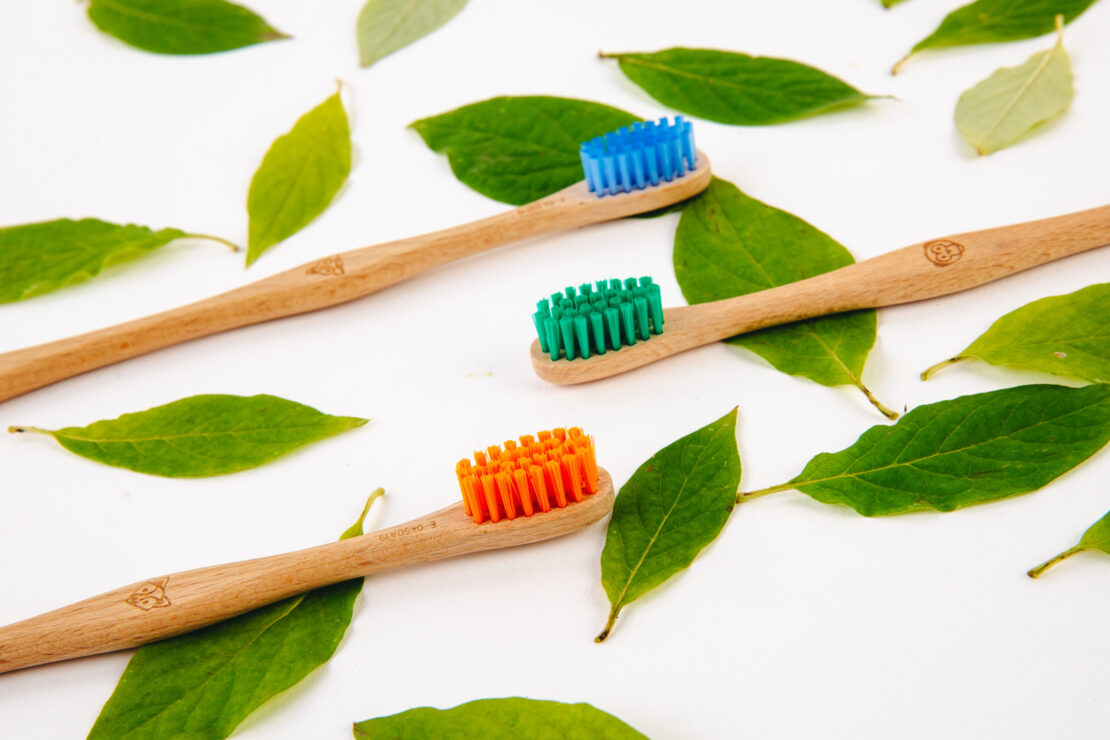
Our values
Our products are made in Switzerland by dental care experts
We refrain from using plastic in our products and packaging wherever possible
We avoid the use of plastic in products and packaging wherever possible
What our customers say
FAQs: Wooden Toothbrushes
Liebwerk toothbrushes are produced in Toggenburg, St. Gallen, by a local manufacturer with over 100 years of experience in dental care products. This heritage ensures that our toothbrushes meet the highest quality standards for your daily oral care routine.
The same factory handles the entire production process, from receiving the raw wood to shaping the handles and tufting the bristles. This integrated approach significantly reduces the ecological impact of manufacturing and ensures rigorous quality control at every stage. By managing the complete production process in one location, we maintain our commitment to both quality and sustainability.
The handles of Liebwerk toothbrushes are made of FSC-certified Swiss beech wood. Known for its hardness, wear resistance, and excellent flexibility, beech wood is the ideal material for toothbrush manufacturing. In addition, it is the most readily available type of hardwood from sustainable forests.
The beech wood for Liebwerk handles is primarily sourced from Toggenburg (SG), with additional supplies coming from the St. Gallen Rhine Valley and Zurich Oberland. This local sourcing supports sustainable forestry practices and minimizes environmental impact, ensuring that our products are both high-quality and eco-friendly.
The FSC (Forest Stewardship Council) certification is a seal of quality for sustainable forest management that focuses on the forest’s sustainability and natural regenerative capacity. Simply put, no more wood is harvested than can regrow sustainably.
Wood is an excellent and sustainable raw material. While Moso bamboo (also known as giant bamboo) is suitable for the production of toothbrushes, it is primarily grown in Asia and South America. The long import routes required to transport bamboo result in high CO2 emissions, which diminish its ecological benefits. Moreover, the limited quality control over the cultivation and processing of giant bamboo, as well as the production standards, reinforce the belief that using local, certified raw materials is the best solution for combining sustainability and quality.
The bristles of Liebwerk toothbrushes are made of two different types of nylon:
- Nylon (PA 6.12): the bristles of the SOFT and KIDS toothbrushes are made of nylon (PA 6.12). Known for its softness, flexibility, and durability, this nylon ensures a gentle yet effective brushing experience, making it an ideal choice for sensitive gums and teeth.
- Castor-oil based nylon (PA 10.10): the bristles of the RICINE toothbrush are medium-soft and made of castor oil-based nylon (PA 10.10), a mineral oil-free bioplastic. This sustainable material offers an eco-friendly alternative without compromising on quality.
We use conventional nylon (PA 6.12) for our soft toothbrushes because it provides the perfect balance of softness and flexibility, making it ideal for individuals with sensitive gums and teeth.
While castor oil-based nylon (PA 10.10) is a great choice for medium-soft toothbrushes due to its slightly firmer texture, it does not provide the same level of softness required for sensitive gums.
By offering both types of nylon, we cater to the diverse needs of our clients, ensuring everyone can find a toothbrush that perfectly suits their oral care requirements.
Rounded bristle tips are clinically proven to effectively remove plaque and food particles without damaging the enamel and gums. This feature is crucial for maintaining oral health.
In contrast, flat-cut bristles can cause irritation and micro-injuries to the gums, potentially leading to gingival damage and recession over time. Most toothbrushes produced in countries and/or factories with low-quality controls lack this essential feature.
At Liebwerk, we guarantee that our toothbrushes, made in Switzerland by dental experts, meet the highest standards of dental care.
There is currently no compostable alternative to nylon bristles other than animal-based materials like wild boar hair. However, wild boar hair poses environmental and hygienic concerns. It often comes from industrial farms, primarily in China, and its hollow structure can become a breeding ground for bacteria.
Bioplastic alternatives, such as castor oil-based nylon, are derived from renewable plant-based oils.
Yet, they do not meet compostability criteria for household composting due to their lengthy degradation periods.
Important note: Nearly all toothbrushes on the market use small stainless-steel hooks to secure the bristles in the head. This makes the entire toothbrush non-compostable, even if it has a compostable handle and animal-based bristles.
- SOFT for sensitive teeth and gums: Soft bristles ensure a gentle yet effective brushing experience and best suit individuals with sensitive teeth and gums.
- RICINE for normal teeth and gums: Medium-soft bristles made of castor oil-based nylon are ideal for those who prefer a firmer brushing experience and a more sustainable version of nylon.
It’s generally recommended to change your toothbrush every 2 to 3 months, or sooner if the bristles become frayed or worn out. This time frame ensures that your toothbrush remains effective at cleaning your teeth and gums. For children or individuals who brush more vigorously, more frequent replacement may be necessary.
Additionally, it’s a good idea to replace your toothbrush after recovering from an illness, especially a viral infection, to prevent the risk of reinfection from lingering bacteria on the bristles.
To extend the lifespan of your wooden toothbrush handle and maintain its quality, follow these tips:
- Apply vegetable oil: Apply a small amount of vegetable oil (such as olive oil or coconut oil) to the wooden handle once a week. This helps protect the wood from humidity and maintains its smoothness by creating a barrier that prevents moisture from penetrating.
- Store dry: After each use, rinse the toothbrush thoroughly and shake off excess water. Store the toothbrush in an upright position so it can air dry completely between uses. Avoid soaking it in water or leaving it in a damp environment.
Replace when necessary: Despite proper care, the wooden handle will naturally wear over time. If you notice cracks, splintering, or significant changes in the wood’s texture, it may be time to replace the toothbrush to maintain good hygiene and avoid potential injury.
To properly dispose of your Liebwerk toothbrush:
- Remove the head: Snip off the head of the toothbrush and discard it in the regular garbage. The nylon and bioplastic bristles, as well as the metal hooks used to secure them, are not compostable.
- Dispose of the handle: The wooden handle is fully biodegradable. You can dispose of it in green waste for composting, where it will help enrich the soil and support renewable energy sources like heat, electricity, and fuel.
- Repurpose creatively: Alternatively, consider repurposing the handle at home. It can be used for plant labels, garden stakes, or other creative projects. Let your imagination guide you!
By following these steps, you can ensure that your toothbrush is disposed of in an environmentally responsible manner.
Liebwerk toothbrushes are packed in a carton box. The packaging is free of plastic and 100% recyclable.
Each person discards about 4 toothbrushes per year, which amounts to about 320 toothbrushes in a lifetime. Considering a toothbrush weighs about 20 grams, this corresponds to 6.4 kg of plastic waste per person from a single daily appliance. Using a sustainable wooden toothbrush, such as a Liebwerk toothbrush, drastically reduces such waste, saving tons of plastic globally every year and helping reduce microplastic pollution and landfill burden.
- Reduction of plastic waste: Sustainable toothbrushes are made from biodegradable materials, for example, wood. This contributes to reducing plastic waste and microplastic pollution.
- Reduced carbon footprint: Truly sustainable toothbrushes are made of locally sourced materials, which reduces the carbon emissions associated with long-distance transportation.
- Sustainable resource use: Producing and processing sustainable materials generally requires fewer resources and generates less pollution than producing plastic.
- End-of-Life options: The handle of a sustainable toothbrush can be composted or otherwise used in gardening.
Choosing between manual and electric toothbrushes depends on personal preferences, dental health requirements, and considerations such as sustainability. With proper brushing techniques, both types are same effective in removing plaque and maintaining oral health.
Electric toothbrushes often come with built-in timers to ensure optimal brushing duration and can make brushing easier for those with limited mobility. Their oscillating or vibrating bristle movements can provide a more thorough clean with less effort.
Manual toothbrushes, on the other hand, are more convenient as they do not require a power source or maintenance and can be used anywhere. Manual brushing also tends to be gentler on sensitive teeth and gums as it allows better regulation of pressure. From an environmental standpoint, manual toothbrushes are much more sustainable as they do not require electricity or batteries. Moreover, only manual toothbrushes offer sustainable options with regard to materials, such as wooden handles and mineral oil-free bristles.
